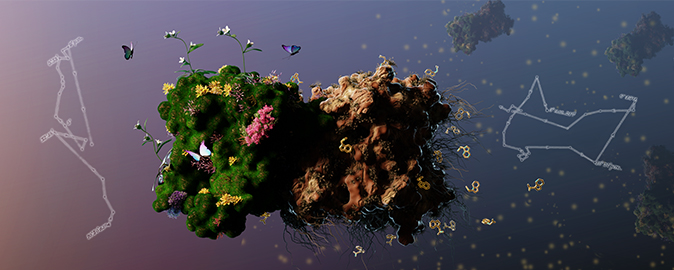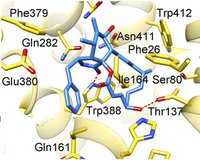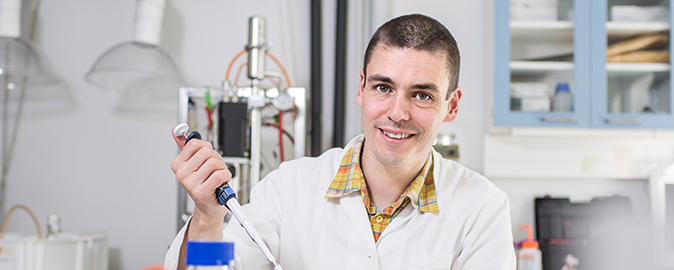New knowledge about cholesterol contributes to the understanding of the neurodegenerative Niemann-Pick type C disease – also called “childhood Alzheimer’s”. These results are yet another step towards treating the disease.
Researchers at Aarhus University have discovered the secrets behind how plants move sugar using a protein called the SUC transporter. This breakthrough solves a long-standing mystery of the plant 'heart' and sheds new light on how plants defend themselves from pests. The discovery published in Nature Plants is the result of over five years of research by a talented team of scientists.

Few have had a broader impact on science than Charles Darwin. While his studies on the Galápagos Islands and his theories on evolution are well known, perhaps many are less aware of his impact on plant science. Now an international research team has made a major step forward towards explaining a central observation that all started with Darwin.
![[Translate to English:] Sugar uptake](/fileadmin/site_files/mb/nyheder/2021/BjoernPP-RuneKFigur-originalv2.jpg)
Researchers at Aarhus University have elucidated structures of a sugar transport protein that drives transport of sugar in plants. The study provides a comprehensive insight into sugar uptake into plant organs such as flowers, seeds and fruit. Future research can benefit from these discoveries to address challenges like food security through crop improvement.
Cholesterol is best known in connection with cardiovascular disease, but cholesterol is also vital for many fundamental processes in the body. In an international collaboration, researchers from Aarhus University have now presented a completely new, ground-breaking model for the integration and incorporation of cholesterol into cells, with great impact on our understanding of this important process.
A small research group at Aarhus University has just elucidated the structure of a sugar transport protein that is unique to plants. The new structure can help explain how plant organs - such as pollen - develop properly, and give ideas as to why some subspecies of wheat are resistant to fungal attacks.
How can cartoon images aid in understanding bacterial biological processes? How did Hollywood contribute to quantum physics? How do aesthetics, art, and design influence scientific visualization and vice versa? These are just some of the questions that a new book raises. Bjørn Panyella Pedersen, Ebbe Sloth Andersen and Ditte Høyer Engholm from MBG are all coauthors of the book.
New research results from Aarhus University and New York University show how active transport of potassium can be achieved by a membrane protein complex that has roots in both ion pump and ion channel super-families. The results, which have just been published in Nature, shed new light on what define channels and pumps.

New research reveals the mechanism behind a cancer-relevant inhibition of human sugar transporting protein. The hope is that this will guide future drug design targeting sugar uptake mechanisms. This will ultimately lead to progress in a number of important common conditions, such as diabetes and cancer.
Bjørn Panyella Pedersen has been appointed Professor in Membrane Protein Biophysics at the Department of Molecular Biology and Genetics at Aarhus University as of 1 May 2024. His research focuses on understanding the molecular mechanisms that govern developmental plasticity in plant growth.

Associate Professor Bjørn Panyella Pedersen from the Department of Molecular Biology and Genetics at Aarhus University receives an ERC Consolidator Grant from the European Research Council for research in plant growth. The amount awarded is EUR 2.0 million and runs over five years.
With a grant of DKK 6,181,260 (USD 900,000) from the Independent Research Fund Denmark, Associate Professor Bjørn Panyella Pedersen can now increase his research efforts to gain a better understanding of the mechanisms behind cholesterol uptake.
Uptake of cholesterol needs to be tightly controlled, and too much cholesterol can lead to cardiovascular disease and other maladies. With a grant of DKK 4.5 mio from the Carlsberg Foundation, Bjørn Panyella Pedersen will aim at uncovering parts of this essential process. His hope is that the work will serve to improve our biological and medical insights into an essential biological process.
MBG Group Leader Bjørn Panyella Pedersen is one of 27 researchers that have been selected to join the Young Investigators Programme of the European Molecular Biology Organization (EMBO) in 2019. For the coming four years, he will join this prestigious network of young scientists.
Assistant Professor Bjørn Panyella Pedersen, Department of Molecular Biology and Genetics at Aarhus University, has been awarded the highly prestigious "Early Career Grant" from DuPont.
Bjørn Panyella Pedersen, Department of Molecular Biology and Genetics, has been awarded a prestigious ERC Starting Grant from the European Research Council (ERC) valued at EUR 1.5 million to start a research group within structural biology at Aarhus University.
Project: Mechanisms behind cholesterol and sugar uptake
The project supported by my AIAS fellowship addresses fundamental scientific questions pertaining to an essential membrane transport system in humans; namely facilitated sugar transport, where new insights will have immediate scientific impact.
With a Sapere Aude Starting Grant of more than DKK 7 million from the Danish Council for Independent Research, Bjørn P. Pedersen is assured of the best possible chance to return to Denmark and establish a structural biology research group at Aarhus University.
The award is given in acknowledgment of the results presented in his PhD dissertation of Molecular Biology defended at the Graduate School of Science at Aarhus University in November 2008. The results describe the molecular structure of the plasma membrane proton pump and the sodium-potassium pump - and both structures were first published in Nature in December 2007 where Bjørn Panyella Pedersen was coauthor on two articles.